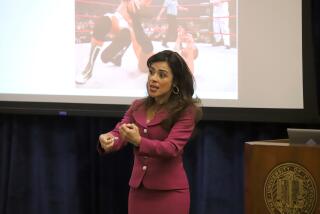Pushed to the Point of Breaking
- Share via
This time a year ago, the highest-achieving senior at Dartmouth College was preparing her valedictory for the students, high-ranking guests and proud relatives who would be attending graduation ceremonies.
What she chose was an untraditional topic remarkable for its intimacy and for its pointed questioning of the very achievement-based mentality that swept her and her classmates into the Ivy League in the first place. Kamala Dansinghani spoke about her eating disorder and the perfectionism that hospitalized her.
Growing up in an intact but unstable family in Connecticut, she said she began learning in elementary school that good grades brought praise from everyone.
“I saw I could do well and if I worked really hard, this could be something I could throw myself into,” she said recently during a telephone interview.
Once she did, of course, the stakes rose. If she scored 98 instead of 100, people wondered what was wrong.
Dansinghani knows it’s hard for others to understand how she felt the summer before her senior year in high school when she learned that her SAT scores were only the second-highest in her class.
“For so long, school and grades had been the stabilizing factor in my life. I felt like the rug was pulled out from under me. I felt I’d lost my sense of identity. So much of who I was was wrapped up in grades and achievements. Without that, what else was there?”
Where another student might turn to drugs or alcohol, Dansinghani cut back on food. After years of psychotherapy, she said she believes it was because losing weight and being thin are good things in our culture. She could still be perfect. At first, losing weight was a rush. But like drugs, at some point she lost control and began being controlled.
That summer Dansinghani, who is 5 feet, 4 inches, lost 30 pounds. She started her senior year at high school weighing 85 pounds.
Dansinghani was hospitalized, her health stabilized, but her problem followed her to Dartmouth, where surrounded by the country’s best and brightest, she felt inadequate.
“I would wake up on Saturdays and be the first person in the library until it closed at midnight,” she said. “I started out freshman year and kept pushing myself like that through junior year.”
Despite the hundreds of thousands of dollars on therapy, she told the graduation audience, it was the nurturing concern of a boyfriend that turned her around. The two ate three meals a day together. They exercised together. He told her she was beautiful and would be even more beautiful if she gained some weight.
Her valedictory, she said later, was a way of thanking him.
After her speech, there were some raised eyebrows and grumbling that such a topic was inappropriate, unintellectual or applicable only to women. Some noted ironically that she had earned her platform to question overachievement because she had overachieved.
Yet, ever since I heard it a year ago, her story has haunted me as a cautionary tale for parents and teachers who push youngsters to achieve, lest they stumble on the academic StairMaster and miss the next step to success--a practice that in the extreme has been called “suburban child abuse.”
Equally troubling to Dansinghani are the more subtle mixed messages. Even when parents insist that their children not worry so much about grades, children know and understand if what their parents really want is to be able to say, “My child goes to Dartmouth.”
Mostly, she said, it’s important for children to know they are loved unconditionally, regardless of report cards, SATs, which college they attend or whether they attend at all.
Dansinghani acknowledged that her down slide was partly due to her own inborn personality. But, she said, she knew many colleagues--young men as well as young women--pressured beyond the breaking point by trying to please their parents.
Now a first-year student at Harvard Medical School, Dansinghani weighs 125 and can say her problems are behind her.
More than ever, Dansinghani is surrounded by overachievers. With a pass/fail grading system, she has no yardstick to compare herself to others. Finally, she said, she accepts learning for the sake of learning alone.
Whenever she feels the urge to be perfect, she tells herself: “There’s no way anyone can be good at everything.”
More to Read
Sign up for Essential California
The most important California stories and recommendations in your inbox every morning.
You may occasionally receive promotional content from the Los Angeles Times.













